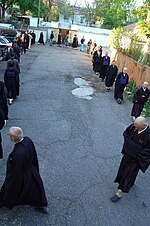― Dōgen
Zen Master Eihei Dogen must have been quoting Shakyamuni Buddha's words to the effect; " In this human form, it is possible to attain liberation from this cycle of life ,death and rebirth, so don't waste time!"
The life of Dogen Zenji was somewhat a tragic one, however it was also the life of a man of courage and adventure, at least according to the YouTube video made by a Japanese Educational Network and Japanese tends to stick to the truth of the matter when setting straight historical events. Dogen had what Shunryu Suzuki Roshi, founder of the San Francisco Zen School, a Beginners's Mind when he set off in search of Zen in China. Dogen would have been like a modern day back packer off to find Yoga in India or some obtuse Tibetan teachings. His first teacher was a cook at a temple who straightened him out as to what or where he should or would find what he was looking for.
Upon his return to Japan and opened his own school Dogen became a pawn in the feudal game of the ruling warlords and samurai warriors vying for power and domination. His life was in constant danger and he had to flee for his life from one monastery to another due to persecution. Dogen's Zen was born out of brimstone and fire and out of the challenges of life of his day he was able to tame the country through his Zen practices which in time gained popularity and respect. The Japanese recognized Dogen's way as the way to be freed from the tyranny of persecution, through body speech and mind.
"The mind is the root from which all things grow. If you can understand the mind, everything else is included. It's like the root of a tree. All a tree's fruit and flowers, branches and leaves depend on its root. If you nourish its root, a tree multiplies. If you cut its root, it dies. Those who understand the mind reach enlightenment with minimal effort. Those who don't...practice in vain. Everything good and bad comes from your own mind. To find something beyond the mind is impossible."- Bodhidharma.
- Bodhidharma
"When we walk like (we are rushing), we print anxiety and sorrow on the earth. We have to walk in a way that we only print peace and serenity on the earth. Be aware of the contact between your feet and the earth. Walk as if you are kissing the earth with your feet."
THICH NHAT HANH
Kinhin -

Walking meditation, also known as kinhin (Chinese: 経行; pinyin: jīngxíng; Japanese pronunciation: kinhin, kyōgyō; Korean: gyeonghyaeng; Vietnamese: kinh hành) is the walking meditation that is practiced between long periods of the sitting meditation known as zazen.[1] The practice is common in Zen, Chan Buddhism, Korean Seon and Vietnamese Thiền
Thich Nhat Hanh, the Vietnamese Chan master with whom I had the opportunity to do two Vipassana retreats at Green Gulch Zen Monastery, is big on walking meditation and he is famous for walking alongside of Martin Luther King Jr. on the "Freedom March' in Washington DC sometime ago. Thay as he is known among his students is always reminding us of our mindfulness when walking that we observe close attention to our inner and outer being in relationship to the external world especially the ground we walk on.
Dogen instructed his students to perform this meditation in between their long hours of meditation especially during a sesshin, a seven days or five of sitting meditation. It is with this walking meditation that the student steps out into the outside world of daily existence, thus engaging life with full attention of a meditative mind. This meditative state of being is apparent in every action that is taken albeit cooking or sweeping the yard or writing a poetry. Buddhism is not static it is dynamic and engaged in the daily activities of body, speech and mind. All in all, Zen Buddhism trains the student to stay in focus with the breath and allows for action to happen effortlessly without too much if any at all of thinking or thought formations. This is attained mainly through sitting meditation, or Zazen.


No comments:
Post a Comment